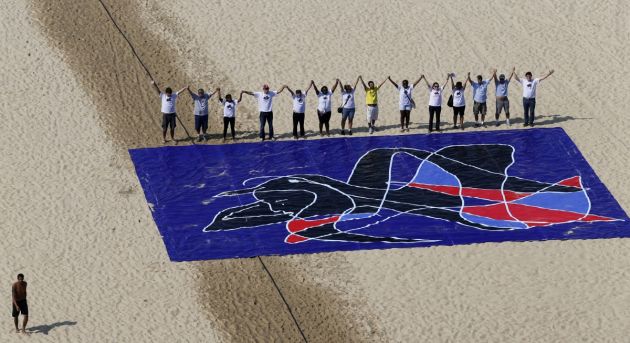UN condemns Iran's harassment of its religious minorities, particularly Bahá'ís

A United Nations committee has expressed serious concerns about "severe limits" on the right to freedom of religion or belief in Iran, and specifically about the ongoing persecution of Iranian Bahá'ís.
The Nov. 15 rebuke was the 29th such censure since 1985 for the Islamic Republic of Iran.
It came in an annual resolution on human rights in Iran, approved by a vote of 85 to 35 with 63 abstentions by the General Assembly's Third Committee, Bahá'í World News Service.
The vote followed a September report by U.N. Secretary General Ban Ki-moon that said Baha'is "are the most severely persecuted religious minority" in Iran.
Earlier in November the New York-based International Campaign for Human Rights in Iran reported that dozens of businesses in Iran owned by members of the Baha'i faith had been indefinitely shut down by the authorities.
The closure came after some owners closed their establishments to honor the birthdays of two of the faith's holiest figures.
CLOSURE OF BAHA'I BUSINESSES
"We have done nothing wrong, but we know that the closure of Baha'i businesses on this scale throughout the country isn't a coincidence," a Baha'i business owner from the city of Karaj who asked not to be identified told the International Campaign for Human Rights in Iran.
"I only ask the authorities to be fair. We, too, are Iranians. We have a right to live, have a family, and work for a living to support our family. I hope they open their eyes."
The U.N. resolution in New York expressed "serious concern about ongoing severe limitations and restrictions on the right to freedom of thought, conscience, religion or belief, restrictions on the establishment of places of worship, attacks against places of worship and burial and other human rights violations."
These included harassment, persecution, arbitrary arrests and detention, denial of access to education and incitement to hatred that leads to violence against persons belonging to recognized and unrecognized religious minorities.
OTHER MINORITIES HARASSED
The minorities included were: Christians, Jews, Sufi Muslims, Sunni Muslims, Yarsanis, Zoroastrians and members of the Baha'i faith and their defenders.
It "calls upon the Government of the Islamic Republic of Iran to release all religious practitioners imprisoned for their membership in...activities on behalf of a recognized or unrecognized minority religious group, including the seven Baha'i leaders declared by the Working Group on Arbitrary Detention of the Human Rights Council to have been arbitrarily detained since 2008."
It call on Iran to eliminate, in law and in practice, all forms of discrimination, including economic restrictions, such as the closure or confiscation of businesses and properties, the cancellation of licenses and denial of employment in certain public and private sectors.
They include government or military positions and elected office, and other human rights violations against persons belonging to recognized and unrecognized religious minorities;
The resolution also expressed concern over Iran's "alarmingly high" use of the death penalty, its "widespread and systematic use of arbitrary detention," and the persecution of political opponents, human rights defenders, journalists, and women's and minority rights activists.
"While Iran has sought to normalize its relations with the world, the passage of this resolution shows that the international community still feels that the human rights situation in the country remains an issue and requires serious attention," said Bani Dugal, the Principal Representative of the Baha'i International Community to the United Nations.
"Certainly, in the case of Iranian Baha'is, things have changed for the worse," said Dugal.
She noted the Iranian government has shifted its tactics to more sophisticated and less quantifiable forms of persecution, social, economic, and educational in nature, "with the aim of making it harder to document cases of persecution."
Dugal said, "Economic strangulation is also spreading further. Just two weeks ago, for example, the government shut down more than 100 Baha'i shops throughout the country after their owners had closed to observe Baha'i holy days, reflecting one element of severe economic discrimination - as documented in a recent letter to Iranian President Hassan Rouhani."
She added that the government continues to arrest and imprison Baha'is and that young Baha'is are blocked from attending university.
"Overall, the government's program against Baha'is amounts to a highly coordinated effort to destroy this community as a viable entity," she said.
The U.N. resolution was introduced by Canada and had 41 co-sponsors.